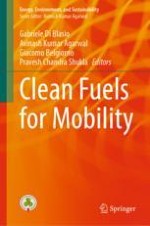2022 | OriginalPaper | Buchkapitel
5. Ethanol Derived from Municipal Solid Waste for Sustainable Mobility
verfasst von : Mohd Mubashshir Naved, Amaanuddin M. Azad, Roshan Wathore, Hemant Bherwani, Nitin Labhasetwar
Erschienen in: Clean Fuels for Mobility
Verlag: Springer Singapore
Aktivieren Sie unsere intelligente Suche, um passende Fachinhalte oder Patente zu finden.
Wählen Sie Textabschnitte aus um mit Künstlicher Intelligenz passenden Patente zu finden. powered by
Markieren Sie Textabschnitte, um KI-gestützt weitere passende Inhalte zu finden. powered by
